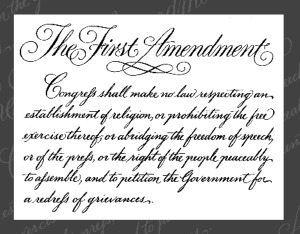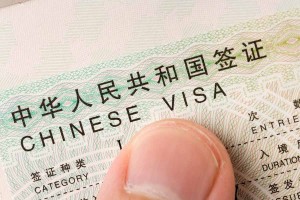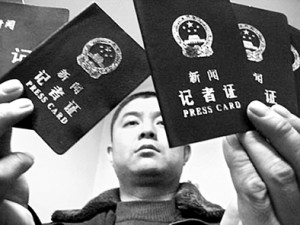But if not the Chinese Media Reciprocity Act, Then What?
Part 3 of a three part series on the Chinese Media Reciprocity Act & foreign journalists in China
(Click here for Part 1; click here for Part 2)
 There is a chance that passage of the Chinese Media Reciprocity Act could result in China granting visas to U.S. government journalist, but that possibility is slim. The effects of passage of the Act mentioned in Part 1 – the eradication of the Chinese press in the U.S., an all out visa war, and greater suppression of freedom of the press – are much more likely and not positive. But the U.S. does not have to sit back and just watch the Chinese government harass and censor their journalists. Below are some less extreme alternatives that the U.S. government can conduct to express its displeasure with the Chinese government and perhaps change the current situation.
There is a chance that passage of the Chinese Media Reciprocity Act could result in China granting visas to U.S. government journalist, but that possibility is slim. The effects of passage of the Act mentioned in Part 1 – the eradication of the Chinese press in the U.S., an all out visa war, and greater suppression of freedom of the press – are much more likely and not positive. But the U.S. does not have to sit back and just watch the Chinese government harass and censor their journalists. Below are some less extreme alternatives that the U.S. government can conduct to express its displeasure with the Chinese government and perhaps change the current situation.
Alternative #1: Raise the Issue When it Happens
The U.S government’s tepid response to Melissa Chan’s unlawful expulsion was a missed opportunity to underscore the U.S.’ commitment to freedom of the press to the Chinese government. The Chinese Media Reciprocity Act is not necessary if the U.S. government publicly stresses that this is an important issue. While some may argue that private diplomacy and comments work better with China, the current Administration has publicly censure China when its behavior bucks international human right standards. As recently as last Tuesday, while on a trip to Mongolia, Secretary of State Hillary Clinton publicly criticized China for its lack of freedom for its own people.
Similarly, if freedom of the press means something, after Melissa Chan’s expulsion, the U.S. State Department should have issued an official  statement from a high ranking official reprimanding China for unlawfully using the visa process to censor foreign journalist coverage. Perhaps such a statement would have given Beijing pause and might cause it to change from its current course of conduct. But a mere statement of “disappoint” permits Beijing to continue harassing foreign journalists and interfering with their coverage by threatening to deny visa renewals. Rhetoric can make a difference or at the very least serve as a signaling device to Beijing that this is an important issue that the U.S. government is not going to take lightly.
statement from a high ranking official reprimanding China for unlawfully using the visa process to censor foreign journalist coverage. Perhaps such a statement would have given Beijing pause and might cause it to change from its current course of conduct. But a mere statement of “disappoint” permits Beijing to continue harassing foreign journalists and interfering with their coverage by threatening to deny visa renewals. Rhetoric can make a difference or at the very least serve as a signaling device to Beijing that this is an important issue that the U.S. government is not going to take lightly.
Alternative #2: List the Harassment of U.S. Journalists on its Website
The Foreign Correspondent Club of China (“FCCC”) previously posted their members’ incidents reports and the yearly surveys on their website. But since February 2011, the FCCC is no longer posting the reports or the surveys because of increasing pressure from the Chinese government. As Peter Ford, president of the FCCC, told China Law & Policy, the FCCC removed mention of the incident reports because “the [Chinese] Foreign Ministry threatened the FCCC president and other officers with unspecified ‘serious consequences’ if the club continued to make public statements that the government regarded as political. To ensure the club’s continued existence we have since limited our public statements to particularly egregious violations of our journalistic rights and freedoms, such as physical injuries sustained by foreign reporters at police hands and Melissa Chan’s expulsion.”
The public availability of the incident reports provided an important look into the treatment of foreign journalists in China, including their visa issues. But with the Chinese government’s censorship of the FCCC, that important information is no longer available and it becomes difficult to know the current situation in Beijing.
But the U.S. Embassy in Beijing can serve this function by posting U.S. journalists’ incident reports. At the very least, they can list the issues that U.S. journalists are having with the visa process serving two purposes: informing its citizens about the j-visa process and highlighting to the Chinese government that this is a serious matter that the Embassy plans to monitor. The U.S. Embassy in Beijing does something similar for air pollution; the Embassy has a page dedicated to listing air quality reports every hour. This webpage has irked the Chinese government since the Chinese Ministry of Environmental Protection hosts a similar webpage but usually with more positive air quality numbers, making apparent that someone is not telling the truth. There is no reason why the same can’t be done with U.S. journalists in China.
Alternative #3: Deny a Visa
But another reason why the Chinese Media Reciprocity Act is not necessary – and another tool that can be used to protect our journalists in Beijing – is that the U.S. can deny visas under current law. The Immigration and Nationality Act provides the executive branch with a list of circumstances, which at times are very vague, where the government can deny a visa. Section 212(a)(3)(C) allows the State Department to deny a visa if there are adverse foreign policy concerns: “An alien whose entry or proposed activities in the United States the Secretary of State has reasonable ground to believe would have potentially serious adverse foreign policy consequences for the United States is inadmissible.” Within the courts, the executive branch is given almost exclusive deference in immigration and visa decisions. See Kleindienst v. Mandel, 408 U.S. 753 (1972).
If rhetoric does not work with the Chinese government, the U.S. government can threaten to deny a visa to a single Chinese reporter. This might  do the trick without damaging freedom of the press too much. In “The Visa Dimension of Diplomacy,” Prof. Kevin D. Stringer analyzed the use of visas as a diplomatic tool. Although Stringer is not keen on the denial of a visa as a sanctioning tool, he does note that on occasion it has produced positive results. After India unexpectedly conducted nuclear tests in 1998, the U.S. denied a visa to Dr. R. Chidambaram, the Chairman of the Indian Atomic Energy Commission, who had come to the U.S. multiple times before.
do the trick without damaging freedom of the press too much. In “The Visa Dimension of Diplomacy,” Prof. Kevin D. Stringer analyzed the use of visas as a diplomatic tool. Although Stringer is not keen on the denial of a visa as a sanctioning tool, he does note that on occasion it has produced positive results. After India unexpectedly conducted nuclear tests in 1998, the U.S. denied a visa to Dr. R. Chidambaram, the Chairman of the Indian Atomic Energy Commission, who had come to the U.S. multiple times before.
The denial was symbolic but had a larger psychological impact on Indians on work visas or those who wanted to send their children to a U.S. college.; would their visas be denied as well? How far would the U.S. go?
Similarly, the U.S. government could threaten to deny – or just not process – a visa to a key Chinese reporter. In February 2012, to much fanfare in China, the Chinese government launched CCTV America, based in Washington, D.C. A threat to deny a visa to one of their top reporters or directors could put the Chinese on notice that the U.S. is not going to stand for the harassment of U.S. reporters abroad. Similar to the 1998 India situation, given the large number of political elites’ children who attend college in America, a single visa denial could have a similar psychological impact on influential elites in China.
 The U.S. does not have to pass the Chinese Media Reciprocity Act, but it does need to communicate its displeasure with the way foreign correspondents are treated in China. There are other avenues to do that but one thing is clear, the U.S. government must start raising this issue otherwise things will only continue to deteriorate as it has for the past three years.
The U.S. does not have to pass the Chinese Media Reciprocity Act, but it does need to communicate its displeasure with the way foreign correspondents are treated in China. There are other avenues to do that but one thing is clear, the U.S. government must start raising this issue otherwise things will only continue to deteriorate as it has for the past three years.
 On Facebook
On Facebook By Email
By Email 




